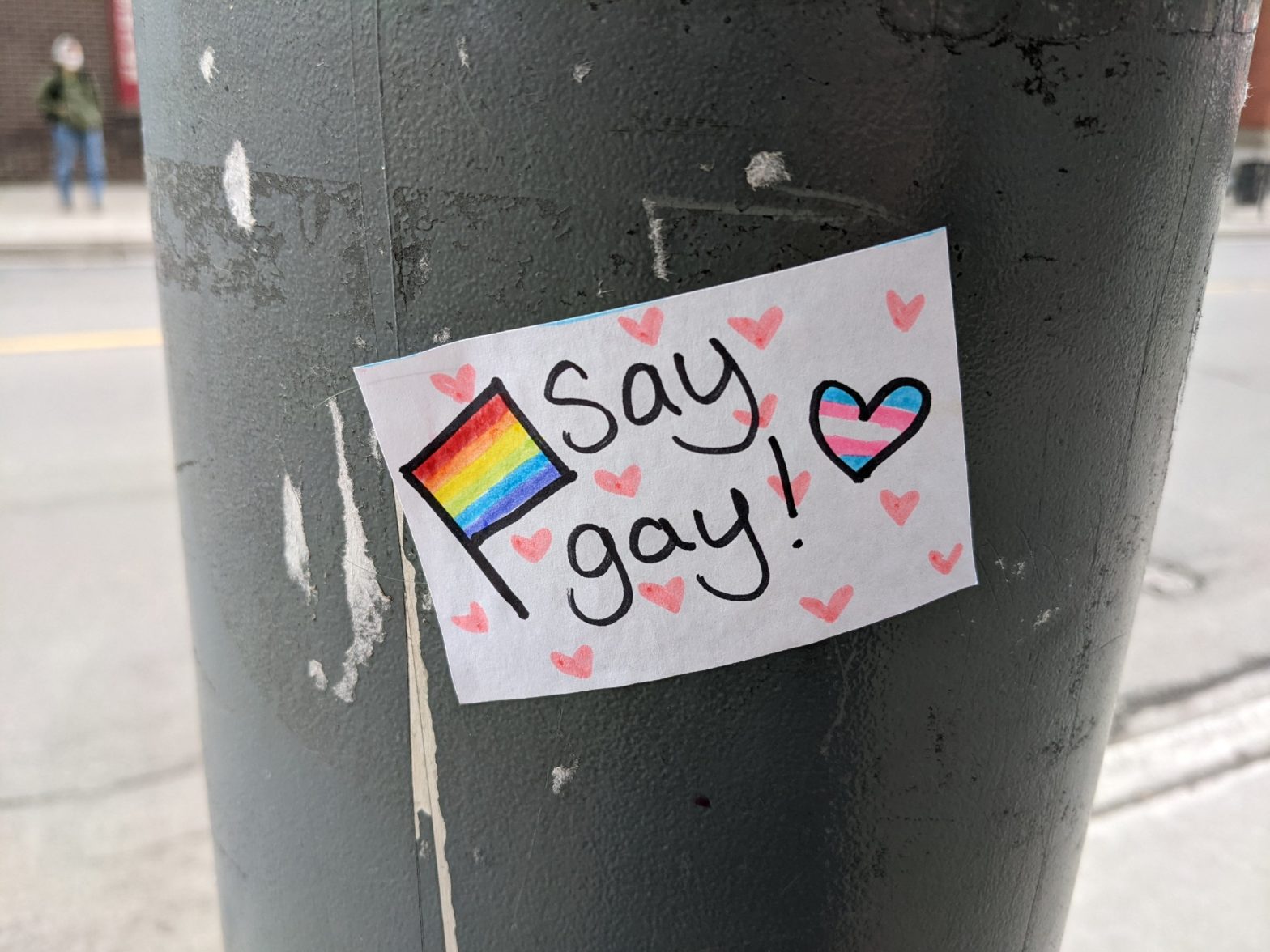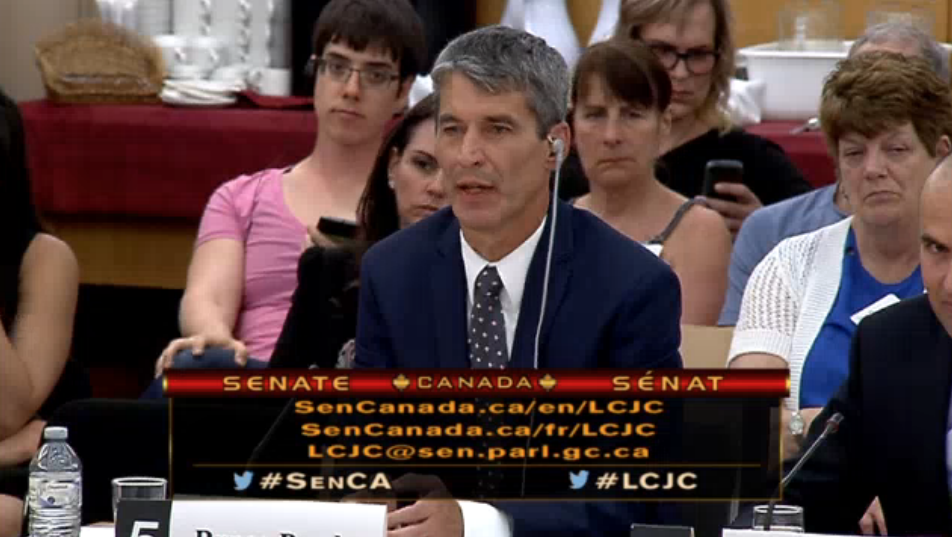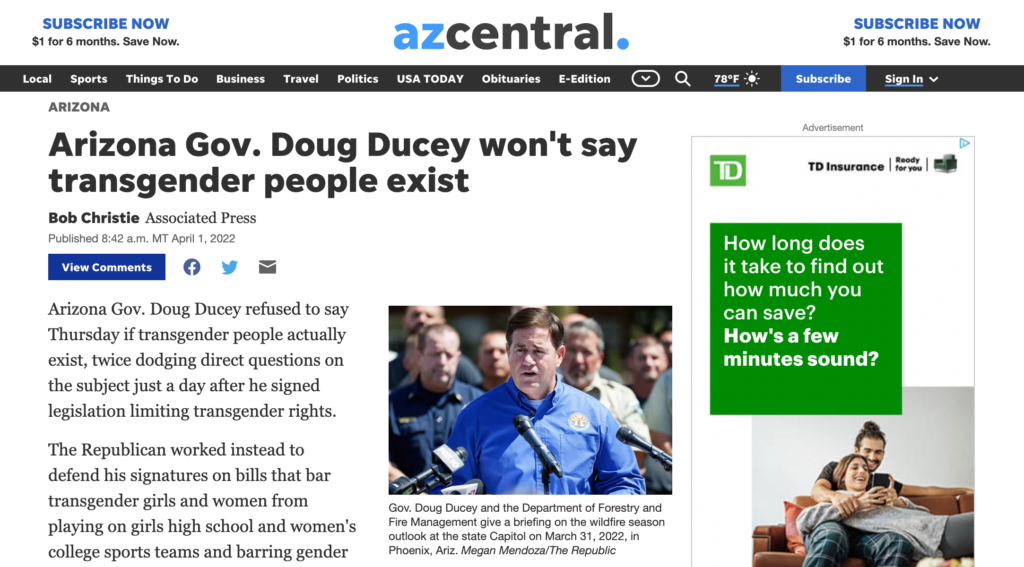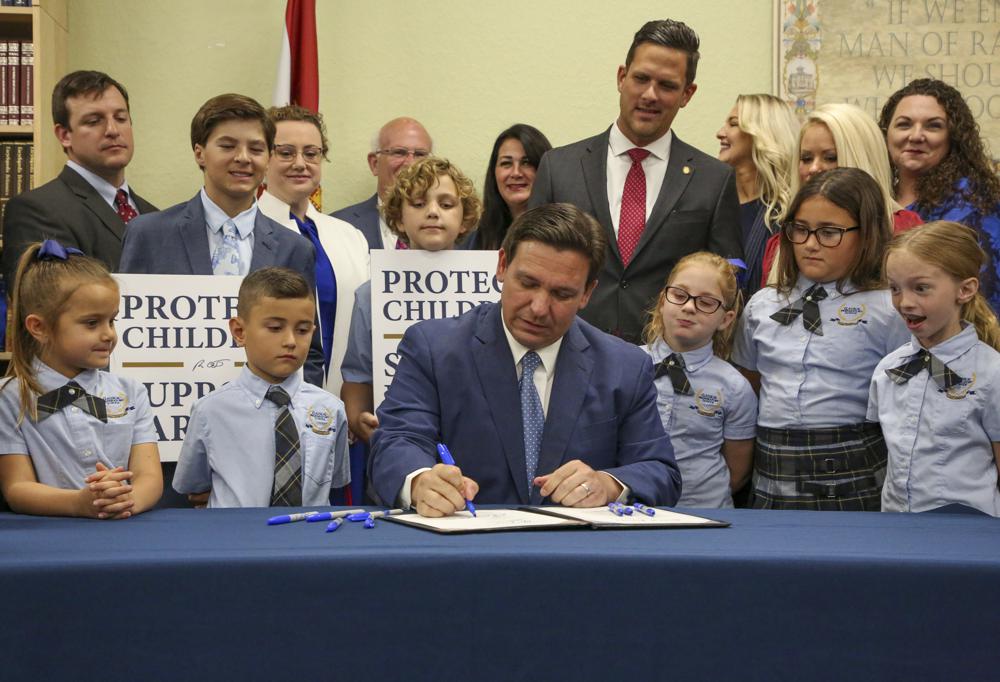This is the transcript of a session I led at my company, a San Fransisco start-up in the solar energy space where I work as senior software engineer, and where I also volunteer on its rainbow ERG. The slides are available here.
Who Am I
My name is Maëlys (she/her), and here I’m a backend dev, but for most of my adult life I’ve also been actively involved in advocacy work on queer & trans issues. This is me in Parliament during Bill C-16, which added gender identity and gender expression to the Canadian Human Rights Act:
Gender & Race Matters
This event is a discussion about laws and policies that have been targeting gender and sexual minorities with a particular focus on the US with some added context out of Canada and the UK to reflect where our employees are located. But before we get to that, we need to cover what these laws are, and before that we need to first acknowledge where this prejudice comes from, and that means talking about gender and race.
We live in a society with a history of white men dominating institutions such as legislatures, religious lobby groups, movie censorship committees, newspaper editorial control, publishing companies, health care, and the justice system. Generations of gender and racially segregated power depended on the myth that this hegemony was natural, and therefore too its agency over other bodies, and that meant buying into rigid beliefs about women and skin tone. This (white) man-made hierarchy was woven in the policing of gender and race by these institutions.
For those not on the receiving end, allegations of “policing gender” might sound dubious, but it’s been plain to see to those who transgressed gender norms. In San Fransisco, being perceived as a man wearing a dress would get you arrested well into the 1970s. In Canada, being “incurably homosexual” was enough to be in prison for life in the seventies and investigated by the RCMP as a national security threat in the nineties. In the UK, it was illegal to “promote homosexuality” as late as 2003. In multiple states of the US, “homosexual conduct” was also illegal until 2003 and same-sex marriage until 2015. In my city, half of the homeless youth are LGBTQ, because some parents are more comfortable embracing gender norms than their own child. It is ubiquitous. If you post a nipple on Instagram, it could get the account banned if it’s a woman’s and not a man’s. Disney will still censor a kiss between two women. Netflix paid millions to produce transphobic specials and then fired a Black trans employee that spoke up about it. I’ve had complete strangers ridicule me, call me slurs, pull at my bra straps and grope my breasts because I didn’t conform to their gender expectations while walking on the sidewalk.
The intersection of gender with the whiteness of those who do the policing factors into this as well. Cis Black women are disproportionately scrutinized and disqualified from athletic events over “biology” compared to cis white women; in Canada it is almost exclusively sex-working trans women of colour who are murdered.
So it’s in this context we find ourselves in 2022 where gender and sexual minorities are being litigated in legislatures and the court of public opinion. During the first three months of this year 240 bills were introduced targeting LGBTQ people in the United States. In the UK, there’s been hundreds of anti-trans pieces in everything from the Daily Mail to the BBC and The Economist and the Equality and Human Rights Commission just released a guide on how to lawfully exclude trans people. The goal is simple: purge society of people who are not straight or cisgender.
Of course, that’s not how it’s framed.
Dog Whistles
Having done this for over a dozen years, I’ve heard a lot of arguments against acceptance. They boil down to this: departures from being straight and cis aren’t a legitimate form of diversity. We are sexual deviants, and our deviance makes us a threat in gendered spaces and to impressionable children. Those who say these things don’t purport to get rid of the identity, so much as anything that actualizes the identity. To borrow a Christian phrase: hate the sin, love the sinner.
So for laws, being gay isn’t illegal, but in Kansas, gay men having sex is still a crime. In Canada, being trans isn’t illegal, but donating blood while being a trans woman can be. In Alabama, a cis woman has agency over her own body, but she will be charged with manslaughter if she miscarries after being shot.
Which brings us to dog whistles.
When legislators introduce homophobic laws and policies, it’s not good enough to say that homosexuals are a menace anymore. It’ll backfire. So they come up with excuses that have the same outcome of marginalizing them, but sound reasonable to a critical mass of straight and cis people. They’ll say it’s about religious liberty or parental rights or military readiness or fairness in sports. These excuses that invert who is being victimized and obfuscate this intent of disenfranchising minorities are called dog whistles.
Which brings us to this latest cohort of laws and policies in the United States and what they purport to be about.
Texas
There’s three attempts in particular that are getting a lot of attention in the US. The first is Texas’ policy of forcibly removing trans youth from supportive families, forcing them to detransition, and placing them in a foster system which is known itself for perpetrating child sexual abuse. The second is Florida’s “Don’t Say Gay” bill. The third is Utah’s ban on trans girls in sports.
With the Texas one, this was a non-binding legal opinion, not a bill, from Texas Attorney General Ken Paxton acting at the behest of Governor Greg Abbott stating that gender affirming care for trans youth was child abuse. This is the same AG who later said that a school’s Pride week “breaks state law“.
That it was “non-binding” doesn’t matter. The biggest paediatric hospital in the US, based in Houston, ceased giving life-saving care to gender diverse youth. Investigations were opened into families that supported their gender non-conforming children, including an employee of the state’s Department of Family and Protective Services. The employee has a 16 year old who is trans and that she accepts. For this she was placed on administrative leave, was visited by an investigator, and her workplace is trying to acquire the medical records of her teenager.
The dog whistle being used to justify this cruelty is that cisgender children are being confused into thinking they’re trans, and being given hormones and surgeries that they will later regret. So let’s get the record straight. No child is being given hormones and surgeries. What might happen is that a child might prefer pants over dresses, short hair cuts over long ones, trucks over dolls, whatever. If they have gender dysphoria, they might prefer to go by a different name. Now the parent can either force that child to conform to gender expectations and make them wear dresses, and tell them how they disapprove of them, or they can let the kid be. Either way, there’s no surgeries or hormones.
As the child ages they’ll eventually reach puberty. If a kid who has gender dysphoria is lucky, and I do mean lucky because only 27% of trans youth have very supportive families, if they’re lucky there’s now a paediatric medical professional who has been following their care. Depending on the needs of the child, their medical provider can prescribe hormone blockers. Cisgender kids get prescribed these all the time when there’s early onset of puberty. It delays it. If they stop they’ll have a normal puberty. Without puberty blockers a trans girl for example would go through permanent changes such as a lowering of the voice that might create distress and life-long adversity.
When the youth get to be sixteen or so, they can choose to go on hormones. The care is highly individualized, so whether they go on these really depends on the adolescent. This treatment will result in some irreversible changes, such as a dropping of the voice with testosterone, but that’s also the age where you can be licensed to drive a car and make far more permanent decisions. Finally in adulthood they can access surgical care; depending on the jurisdiction it can be a bit younger at 16 for a mastectomy.
This care isn’t out of nowhere. UCLA and John Hopkins were delivering gender affirming medical attention to trans youth in the 1960s. These days the standards of care are well established, evidence-based, and supported by the American Academy of Paediatrics, the American Medical Association, the Endocrine Society, the Society for Adolescent Health and Medicine, the American Psychiatric Association, the American Academy of Family Physicians, and the American Psychological Association. No credible medical association opposes this, but you wouldn’t know that from the disinformation that’s out there.
At this point, I could recite a bunch of stats for why denying a supportive environment and essential medical care to vulnerable youth leads to death. I could tell you that suicide attempts go down by 93% when a trans youth is with a supportive family, which matters when the stigma is so bad that 86% of trans youth in the US thought about killing themselves, and 56% tried. I could tell you that regret for gender affirming surgery is under 1%, when it’s 18% for knee surgery. But it doesn’t matter, because no statistic, no medical authority, no perfectly worded argument would convince these elected officials any different. Ken Paxton, the AG behind this turmoil in Texas, had dinner with a mom and her trans son. The mom invited him hoping it would humanize people like her son. You know what happened? That family is now being investigated.
Republicans made trans people the object of their new culture war; they’re committed to this fear mongering.
Florida
Another manifestation of that fear mongering is Florida’s HB 1557, “An act relating to parental rights in education“. “Don’t Say Gay” is the colloquial title for it that dispenses with the dog whistle. The bill has been signed into law.
This law has multiple provisions that will harm LGBT youth, but I want to focus on one: prohibiting schools from covering gender identity or sexual orientation up until grade 3. Thing is, kids in that age bracket aren’t getting sex ed in Florida. What might happen is that a kindergarten teacher reads from a story book where the heroine has two dads. Or a student enters a new grade going by a different name, and the principal gives a little speech to the class to model that it’s not a big deal.
What legislators are doing by passing this law is sending a signal that they, and the state, find there’s something inherently inappropriate about a family with two moms. It’s messaging to bullies that gender diverse students don’t deserved to be treated the same. This ugliness makes sense if you conceptualize of gay and trans people as being inherently sexual and deviants rather than a loved neighbour, a respected colleague, and so forth.
Unfortunately, the ruse of saying that this is about parental rights is effective. Half of Floridians support the text of the bill. I do not give the politicians the benefit of the doubt when it comes to the intent of ostracizing gender and sexual minorities. When you take a step back and look at all the other bills that have been introduced, and all the witnesses that warned of the harm it would wreak, it becomes clear that that was the desired outcome all along.
In Florida they:
- …passed a law to explicitly ban gay people from adopting children.
- …passed a law to ban same-sex marriage.
- …passed a constitutional amendment to ban same-sex marriage and civil unions even though it was already illegal.
- …passed a law to ban trans girls from playing sports with cisgender girls.
- …kept the law that made it illegal for gay men to have sexual intimacy.
The message is loud and clear.
Utah
The third state I’ll cover today is Utah where they have HB 11, “Student Eligibility in Interscholastic Activities“. This legislation makes it illegal for trans girls to play on girls teams against other schools, effectively barring them out of student athletics altogether. The bill became law following an override of the governor’s veto.
The excuse here is fairness in sports. If you find yourself sympathetic to that, you aren’t the only one. This dog whistle was explicitly chosen because it had the power to resonate with so many. So let’s dig into that a bit.
First, let’s be clear. This bill was introduced as a solution in search of a problem. According to the Governor of Utah, there are 75,000 students participating in high school sports in the state. Of those, only four are trans, and only one is a transgender girl. She was never cited as a problem.
That disconnect with on-the-ground realities has been a constant theme of these bans since the first one was signed into law in Idaho in 2020. The sponsor of the Idaho bill, Republican Representative Barbara Ehardt, didn’t even know of a single instance where a trans girl had so much as joined a sports team in her state. She had pre-conceived notions, and instead consulting credible experts, she invited a hate group as designated by the Southern Poverty Law Centre to author a ban. The bill this hate group devised and that Idaho passed is now serving as model legislation for over 30 other states. Some proposals have been even more dehumanizing; Florida’s version to the trans sports ban allowed for the genital inspection of students. It fortunately died.
This so often being faceless, here’s some words from one of the students who was prohibited by law from playing because she’s trans, Lindsay Hecox:
Professional sporting associations support the inclusion of college-level athletes like Lindsay Hecox; among them USA Track & Field, NCAA and the International Olympic Committee. Their policies mandate that the testosterone levels be comparable to cis women’s, and once that’s met, to them it’s fair.
So around the question of fairness, it turns out it’s been fine at the K-12 level, and college level athletics want trans athletes to participate. Where harm has been done is on the mental health of the students for entertaining these arguments: 85% of trans and non-binary youth said that debates about state laws restricting their rights negatively impacted their well-being and 64% of trans youth avoided gym class because they felt unsafe or uncomfortable.
This debate isn’t happening in a vacuum. These students are listening and what they’re hearing is that they don’t belong; not just from bigoted legislators and pundits, but in the comments of TikTok and YouTube, on popular shows and movies from the last decade – everywhere. Only 9% of trans youth say their communities are accepting.
Which is why I categorize the disproportionate numbers of trans youth who end their lives not as suicide, but negligent homicide. Adults made these young people scapegoats for their own discomfort around a more diverse society. Adults outlawed support at schools, outlawed medical care, outlawed access to washrooms, outlawed even a parent’s own love. That over half of trans youth in the US thought about ending their life in the past year alone is a preventable tragedy.
Why Youth
Why have Republicans in all these states chosen to pick on youth? Because it polls well.
Conservatives made culture wars out of same-sex marriage, out of adoption by gay parents, out of military service for gay people, out of anti-discrimination measures. After successive losses around sexual orientation, they shifted to gender identity. But their moral panics around trans adults were faltering with Trump out of office and with North Carolina’s ban on washroom use by trans people eliciting significant economic backlash.
When targeting youth proved a winning formula in one state, copy-cat legislation spawned everywhere. Canada and the UK saw similar shifts in strategy. Making everything worse is that disinformation about these youth, especially trans youth, isn’t just coming out of right-wing echo chambers, but it’s also in the New York Times and the BBC, major bookstores, and podcasts that Spotify paid $200 million dollars to produce. It’s not great.
What You Can Do
We’ve just covered a lot of negativity. So take a second here, shake your legs, take a few deep breaths.
Okay.
So as far as what to do, I’m not going to tell you to write letters to your representatives. It might make you feel better, but it won’t change anything. Instead, give money to the Trevor Project and the Trans Lifeline. Both of these crisis lines are saving lives and every dollar makes a difference. Commit to monthly donations to your local youth shelter. Contribute to the GoFundMes of queer & trans people who are needing help; a hundred bucks goes a long way. The Protect & Defend Trans Youth Fund is also redistributing the donations it gets to on-the-ground groups.
I’d also beckon you to look at your own circle of influence. Challenge views and actions you know to be wrong. This is hard; no one wants to lose by speaking up. But that’s the thing: if you’re not facing friction, you’re not making change. And there’s no difference between silence and complicity.
So if you want to be an agent of a better world, you need to be willing to sacrifice some of your social capital. If a friend makes a transphobic joke, ask them to explain what makes it funny. If a sibling is homophobic, let their kids know you have their back and challenge every one of your sibling’s shitty remarks. Maybe pay for their therapy too. If you witness street harassment, intervene. Give people reason to self-moderate in public.
You’re not going to convince the Greg Abbotts of the world. You’re not going to stop more of these bills from flooding legislatures over the next year. But you can impact your family, your friends, your neighbours and your colleagues. Not with sharing a post on Facebook or changing your profile picture on Instagram, but by being vulnerable yourself in direct conversations.
Never sacrifice your safety, but do interrogate what the difference is between being uncomfortable, and being unsafe. Too often they’re confounded.
Thank you.
Open Discussion
I’m going to turn the table to you now. This is going to be a free-form discussion but I have some questions to kick off, if you want some cues:
- Is there anything that resonated with you?
- Is there any information that was new to you?
- Is there anything you plan on doing different?
- Is there anything you will keep doing?
Learn More
About the spate of anti-trans laws and trans youth:
- Imara Jones’ fantastic podcast, The Anti-Trans Hate Machine
- Jules Gill-Peterson’s book Histories of the Transgender Child
- Standards of Care for Trans Youth
Trans history:
- C. Riley Snorton’s book Black on Both Sides: A Racial History of Trans Identity
- Susan Stryker’s book Transgender History
- Morgan M Page’s podcast One from the Vaults
- Chase Joynt’s documentary Framing Agnes
- Sam Feder’s documentary Disclosure




